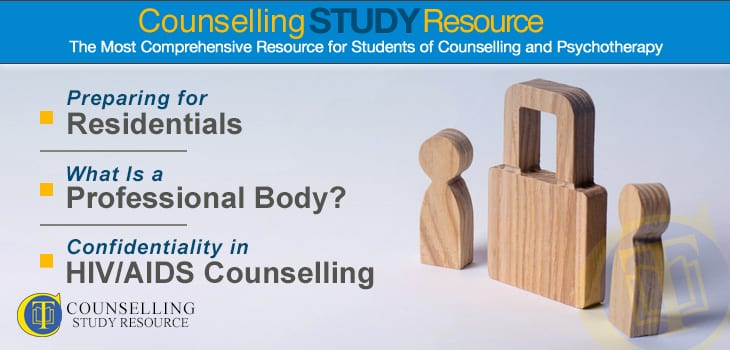Breaking Confidentiality in HIV/AIDS Counselling (starts at 24.10 mins)
Breaking confidentiality is a complex issue that arises regularly in its various forms in our Facebook group (where you’ll find over 23,000 others involved in the world of counselling and psychotherapy).
This particular question relates to confidentiality in HIV/AIDS counselling, or whether you should break confidentiality if you become aware, as a counsellor, that a client of yours who has HIV or AIDS is having unprotected sex.
First, it’s very important to differentiate here between HIV and AIDS: HIV is the virus (having which doesn’t make the person ill), while AIDS is the illness that can develop from this virus.
While the advent of HIV seemed very frightening at the time – partly through the limited treatment options available at that time (meaning it really was then a death sentence), and partly through poor handling by the UK authorities – there are many people now living well with HIV who may never go on to develop AIDS.
Ken also describes his perspective on HIV as a young person growing up in South Africa.
Above all, it is important not to criminalise people with HIV/AIDS, and a private counsellor would not automatically break confidentiality if they knew a client was having unprotected sex – just as they would not do so if a client had venereal disease and was doing so.
Ultimately, adults have the choice to insist on using a barrier method of contraception. It would, however, be different if someone with HIV/AIDS was going out with the express intention of infecting others.
However, when you work for an agency, you must follow its policies, including on confidentiality – so do ensure that you know this policy inside out, for your clients’ and your own protection. If in doubt, ask your managerial supervisor there about confidentiality in HIV/AIDS counselling – ideally by email, so that you have a written record of their response.
Talk to your clinical supervisor too about any such ethical dilemmas. Your professional body should also be able to help about confidentiality and HIV ethical issues.
A good source of high-quality information on HIV/AIDS is the Terence Higgins Trust; the British Psychological Society has also published guidance on psychological support for adults living with HIV.



